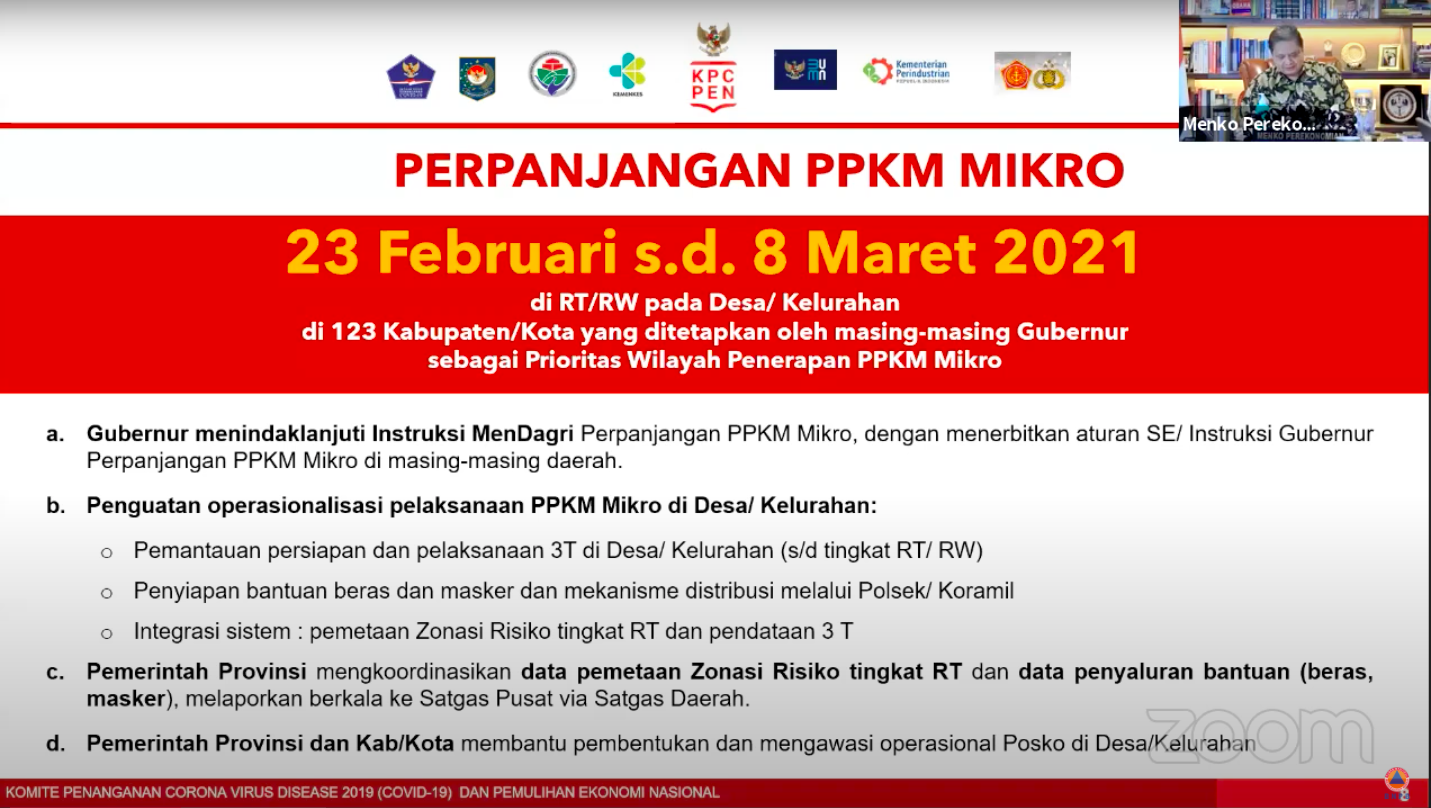Gov’t Extends Micro-Scale Activity Restrictions Until 8 March 2021

Source: Screenshot from the National Disaster Mitigation Agency (BNPB) YouTube TV
The Government has decided to extend the Enforcement of Micro-Scale Restrictions on Community Activity (PPKM Mikro) in the islands of Java and Bali from 23 February to 8 March 2021.
Coordinating Minister for Economic Affairs Airlangga Hartarto, who also helms the COVID-19 Handling and National Economic Recovery Committee, made the announcement in a press conference aired on the National Disaster Mitigation Agency (BNPB) YouTube channel, Saturday (20/2).
According to the Minister, the extension is a follow-up to the evaluation results on the effectiveness of the first phase of PPKM Mikro from 9 to 22 February.
“Based on the evaluation results, we decided to follow up on the extension of the PPKM since the implementation is managed to control the COVID-19 pandemic,” he said.
From the evaluation results, Airlangga pointed out that the country’s number of active COVID-19 cases has significantly decreased to minus 17.27 percent within a week during the PPKM Mikro.
In addition, the trend of active cases in five provinces has also decreased, including Jakarta Province, Banten Province, West Java Province, Yogyakarta Special Region Province (DIY), and East Java Province, he added.
“The bed occupancy ratio (in all provinces) has dropped below 70 percent. The recovery trend in the five provinces has improved, including Jakarta Province, Banten Province, West Java Province, Yogyakarta Special Region Province (DIY), and East Java Province,” Airlangga said.
Moreover, the mortality trend in three provinces has also decreased, including Jakarta Province, West Java Province, and Bali Province.
The survey results also showed an increase in the level of adherence to health protocols in the range of 87.64 to 88.73 percent.
Airlangga further said that on 5-17 February, the national active cases decreased by 2.53 percent, the recovery rate increased by 2.56 percent, and the death rate decreased by 0.03 percent.
“In general, the implementation of PPKM and PPKM Mikro within five weeks has successfully suppressed the rate of new active cases. In fact, the implementation showed a significant decline in active cases,” he added.
Regarding the extension of the PPKM Mikro, Airlangga said that Minister of Home Affairs has issued Instruction of Minister of Home Affairs Number 4 of 2021 which will be followed up by the governors through policy regulations in each region.
In addition, the operationalization of the PPKM Mikro at the village / sub-district level will be strengthened, which includes monitoring the preparation and implementation of the 3T measures (testing, tracing, treatment), providing assistance in the form of rice and face masks through the Sub-precinct Police Stations (Polsek)/Subdistrict Military Command (Koramil), and determining the risk zoning at the neighborhood level and the 3T data.
“The provincial government is expected to coordinate the risk zoning data at the neighborhood level and the assistance distribution data (rice, face masks), and report the data regularly to the Central Task Force through the Regional Task Force,” he said.
Airlangga went on to say that the criteria for province or village / sub-district as well as risk zoning at the micro level for the PPKM Mikro remain the same as regulated in the previous regulation.
“The regulation covers 123 regencies / cities to villages / sub-districts in seven provinces in Java and Bali,” he added.
The Implementation of PPKM Mikro will be coupled with the 3T measures and the fulfillment of basic needs, while villages/sub-districts established guard posts that function to handle, prevent, develop, and support the implementation.
Regarding the 3T measures, Ministry of Health will provide a free antigen swab test for the people in villages / sub-districts using health facilities and community health centers (Puskesmas) in their respective areas.
In the meantime, the Indonesian Military’s village supervisory non-commissioned officers (Babinsa) / the Police’s security and public order officers (Bhabinkamtibmas) will trace COVID-19 using a tracing method educated by Ministry of Health.
Meanwhile, the treatment will include the implementation of self-isolation (household PPKM), centralized isolation (neighborhood PPKM), and treatment at health facilities coordinated by guard posts at the village / sub-district levels.
Regarding the fulfillment of basic needs, the Government will provide 20 kilograms of rice per house (for 14 days of self-isolation), the cloth face-masks according to the national standard for all village / sub-district communities coordinated by the Indonesian National Defense Forces (TNI) and Indonesian National Police (Polri) at the Sub-precinct Police Stations and Sub-district Military Command levels.
“We hope that the implementation of PPKM Mikro can constantly control the COVID-19 pandemic and this will be followed by vaccination programs carried out by Ministry of Health,” Airlangga said. (UN) (RIF/EP)








